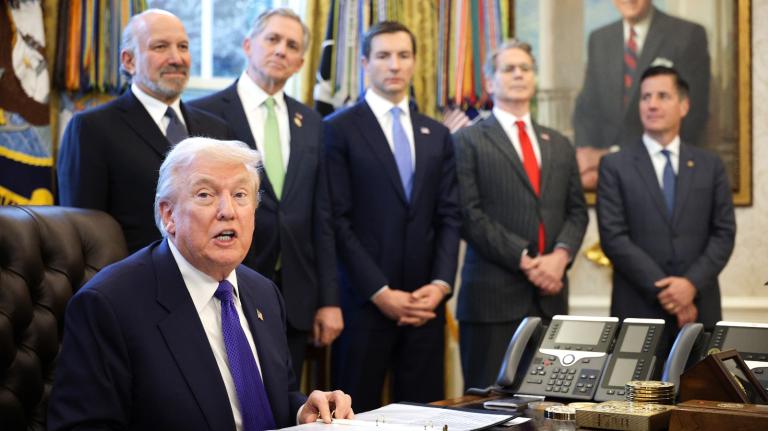Re: Fishy Business
Dear Editor:
I’m shocked that you would choose to criticize Sen. Ted Stevens (R-Alaska) for tacking a measure onto the recently passed $79 million war-spending bill that directs the U.S. Department of Agriculture to come up with a plan for certifying and labeling wild seafood as organic. This measure will do a lot to help the Alaska seafood industry, which produces sustainable harvests of the finest truly organic seafood available in this world.
To criticize this measure is to help the farmed-fish industry drive Alaska’s wild fish industry to bankruptcy. That would reduce the political support for bringing the Pacific Northwest’s salmon back from the brink of extinction (due to bad forest practices, bad irrigation practices, and bad hydroelectric practices — not overfishing) and for preventing the farmed fish industry from continuing its environmentally devastating practices, which are beginning to erode the very bottom of the food chain with dire consequences for everything above.
Ron Richards
Centennial, Colo.
Re: Who’re You Calling Chicken?
Dear Editor:
I appreciate your article differentiating among the various labels on eggs, but I wish you had addressed the core ethical issue of whether we ought to be eating eggs at all, at Easter or anytime. Chickens used for egg-laying are killed when they are no longer productive and male chicks are often disposed of as soon as they are born. Making people feel good about eating any eggs, no matter the labeling, does these chronically abused birds a serious injustice.
Megan Metzelaar
Montvale, N.J.
Re: Who’re You Calling Chicken?
Dear Editor:
Your article on egg labeling is very informative about the relatively meaningless labels corporations attach to our food to entice consumers and raise confidence. There are two additional points worth making:
First, rather than relying on labels alone, consumers should visit the farms where their eggs, meat, and vegetables are produced to see what methods are used. Of course, this is possible only with locally grown food, and it is one of the best arguments for a local/regional food supply.
Second, almost everyone can grow some portion of their own food. With a good-sized backyard and biointensive gardening techniques like those used by John Jeavons or the permaculturists, it is certainly possible to grow 10 percent of your vegetable food as a part-time venture. Small animals like chickens can be worked into a backyard food garden using moveable electric net fencing and solar chargers or movable pasture units sometimes called “chicken tractors.” When we lived on a quarter-acre lot near San Francisco, we had three Khaki Campbell ducks in our backyard that supplied all the eggs we needed and also kept the slugs and snails under control without chemical poisons.
John Wages
Tupelo, Miss.
Re: Who’re You Calling Chicken?
Dear Editor:
When I was a boy in the ’20s, our chickens could go out during the day anywhere they wanted. They were kept in at night for their safety because weasels, etc., were a danger. What label would you use for those lucky creatures?
Stan Wilkinson
Calgary, Alberta, Canada
Dear Editor:
I wish to congratulate Odigha Odigha for his doggedness in the pursuit of what he believes in. Very few of us have that ability. I have known Odigha for over 25 years and I am happy he still maintains this great quality of fighting for the poor and weak. I also come from the Ikom forest area and can attest to the horrifying destruction that has been meted out to the forest.
Tony Edako
Washington, D.C.
Dear Editor:
Thank you for your articles on ecological economics. One part that was missing was looking at the bigger picture and where Bob Costanza, Herman Daly, and Josh Farley fit in. There is a big split between so-called resource economists, who are mainstream; environmental economists, who are on the edge; and ecological economists, who seem to be making ground but still have a ways to go. My past work managing the Pew Center on Global Climate Change’s economic report series highlighted this for me. Some interesting people to speak with to get this larger perspective are William Nordhaus at Yale (resource economics guru) and David Pearce at University College London (environmental economics guru).
Tony Brunello
South Lake Tahoe, Calif.
Dear Editor:
Last semester, I took macroeconomics. Our textbook listed factors that impeded economic growth, including government restrictions, but not limited natural resources! I asked the professor why, and he said we would discuss that later. Needless to say, it wasn’t discussed. Our textbook was the most popular economics 101 textbook in the U.S., so I assumed that economics professors all over the country were sticking their heads in the sand. It’s heartening to hear that economic heretics who dare to think scientifically exist and are getting recognition, if not influencing policy.
Vanessa Baker
York, Pa.
Dear Editor:
Your ecological economics series is a disappointing read. None of the gurus offer a new paradigm. There is nothing nearly radical enough to slow down (let alone transform) global environmental destruction. Hazel Henderson was way ahead of university-trained economists decades ago.
Sustainable development (much maligned by enviros) calls for a very different kind of economics, which having been reformed is then integrated as but one arm of sustainable development, with the other two arms being natural environment and social equity. This is radical, and it’s not happening. Why not? The best explanation and application of this model comes not from an economist but an architect — Michael McDonough.
These economists are doing what economists have always done — giving the destructiveness of economics a pretty, convincing face. Adding some frills of enviro-friendliness will make no difference in the real world.
Peter Carter
Pender Island, British Columbia, Canada


